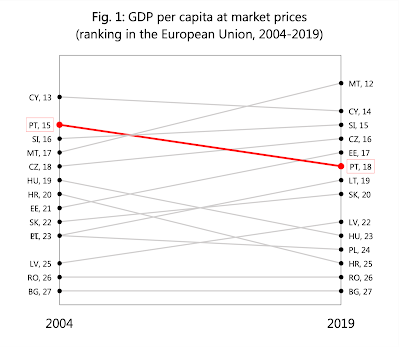Portugal's economy: continuously outperformed by former USSR economies?

Premise: Almost all political candidates argued that while the Portuguese economy converged with the European one, it was still outperformed by those from the former USSR economies that joined the European Union since 2004. The European Union membership expanded by 13 members (from 15 to 28, now 27) since 2004. These were: 2004: Czech Republic (CZ) Cyprys (CY) Estonia (EE) Hungary (HU) Latvia (LV) Lithuania (LT) Malta (MT) Poland (PL) Slovakia (SK) Slovenia (SI) 2007: Bulgaria (BG) Romania (RO) 2013: Croatia (HR) Of these, only the Czech Republic, Hungary, Poland, and Romania have not adopted the Euro as their currency. Let's assume politicians use GDP per capita (at market values) as the metric of choice. In that case, Portugal went from being the 15th richest country in the EU-27 in 2004 to the 18th in 2019. Between 2012 and 2019, four countries overtook Portugal in the ranking: Malta (17th to 12th), Slovenia (16th to 15th), Czech Republic (18th to 16th), and Estoni...
